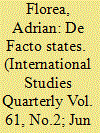|
|
|
Sort Order |
|
|
|
Items / Page
|
|
|
|
|
|
|
| Srl | Item |
| 1 |
ID:
159486


|
|
|
| 2 |
ID:
155493


|
|
|
|
|
| Summary/Abstract |
De facto states—polities, such as Abkhazia (Georgia) or the Donetsk People’s Republic (Ukraine), that appropriate many trappings of statehood without securing the status of full states—have been a constant presence in the postwar international order. Some de facto states, such as Northern Cyprus, survive for a long period of time. Others, including Tamil Eelam in Sri Lanka, are forcefully reintegrated into their parent states. Still others, such as Aceh in Indonesia, disappear as a result of peacemaking. A few, such as Eritrea, successfully transition to full statehood. What explains these very different outcomes? I argue that four factors account for much of this variation: the extent of military assistance that separatists receive from outside actors, the governance activities conducted by separatist insurgents, the fragmentation of the rebel movement, and the influence of government veto players. My analysis relies on an original dataset that includes all breakaway enclaves from 1945 to 2011. The findings enhance our understanding of separatist institutional outcomes, rebel governance, and the conditions that sustain nonstate territorial actors.
|
|
|
|
|
|
|
|
|
|
|
|
|
|
|
|
| 3 |
ID:
181097


|
|
|
|
|
| Summary/Abstract |
While research on interstate rivalries is abundant, scholarship examining nonstate rivalries remains limited. To address this shortcoming, in this article we introduce the Armed Nonstate Actor Rivalry Dataset (ANARD) – a dataset which captures dyadic rivalries and militarised disputes among armed nonstate actors in the Middle East and North Africa (MENA) between 1993 and 2018. We begin by explaining why fine-grained data on militarised interactions between armed nonstate organisations are needed for a comprehensive understanding of conflict. We then provide details of the data collection process and coding practices. Finally, we identify the contributions that ANARD can make to conflict research.
|
|
|
|
|
|
|
|
|
|
|
|
|
|
|
|
| 4 |
ID:
158409


|
|
|
|
|
| Summary/Abstract |
Dictators' survival depends on the effectiveness of their coup-proofing tactics. Yet coup-proofing strategies can become ineffective in the presence of certain structural conditions that enhance the resources, organizational power, and coordination capacity of the army. One such structural condition is the presence of spatial rivalry, international rivalry over disputed territory. Autocratic incumbents invested in spatial rivalries need to strengthen the military in order to compete with a foreign adversary. The imperative of developing a strong army puts dictators in a paradoxical situation: to compete with a rival state, they must empower the very agency—the military—that is most likely to threaten their own survival in office. This logic suggests that authoritarian regimes engaged in spatial rivalries will be more vulnerable to coups. Indeed, relying on the most comprehensive coup dataset to date, this article reveals that rivalry over territory is a robust predictor of coups against autocrats. The findings carry implications for research on civil–military relations, international rivalries, and organizational dynamics within authoritarian regimes.
|
|
|
|
|
|
|
|
|
|
|
|
|
|
|
|
| 5 |
ID:
111972


|
|
|
|
|
| Publication |
2012.
|
| Summary/Abstract |
Since the early 1990s, the large-N civil war research program has been a vibrant one but has reached an analytical plateau because methodological issues have obscured fundamental conceptual and theoretical concerns. The existing ground-clearing work has shed light on macro- and micro-level determinants of internal conflict onset, duration, and termination, but has left the field theoretically impoverished. This article discusses remaining gaps in the quantitative civil war literature, and proposes conceptual, theoretical, and methodological remedies. Five main lacunae are identified. First, civil war may be a longer process, with several waves of escalation and de-escalation, than generally described in the extant literature. Second, existing theories conflate civil conflict with violence-war onset and violence may be conceptually distinct. Third, we have few systemic-level theories of civil war onset and duration. Fourth, we need better theories that allow us to determine whether civil wars are different from other types of wars. Finally, we need to go beyond state-centric monadic approaches, and be more rigorous when building our models for explaining civil war onset, duration, or termination.
|
|
|
|
|
|
|
|
|
|
|
|
|
|
|
|
|
|
|
|
|